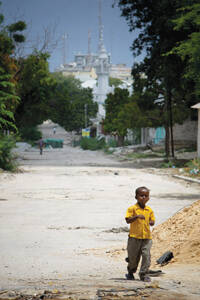The world noted the plight of children trapped in warfare on Feb. 12 during the annual Inte rnational Day Against the Use of Child Soldiers. The United Nations reports that thousands of children in at least 15 countries are forced every day to serve in armed gangs or armies as combatants, spies or in sexual servitude.
A report released just a few days later by Human Rights Watch suggests how far the world remains from the goal of preventing children from being used as combatants. According to Human Rights Watch, Somalia’s warring parties have all failed to protect Somali children from the fighting or from serving in their forces. The Islamist insurgent group al-Shabaab has increasingly targeted children for recruitment and rape and attacked teachers and schools, Human Rights Watch said.
Since Somalia’s conflict intensified in 2010 and 2011, al-Shabaab has increasingly forced children as young as 10 to join its dwindling ranks. Child recruits are sent to the front lines, where some serve as cannon fodder to protect adult fighters, Human Rights Watch found. Others have been coerced into becoming suicide bombers.
A 15-year-old boy told Human Rights Watch that in 2010, “out of all my classmates—about 100 boys—only two of us escaped; the rest were killed. The children were cleaned off. The children all died and the bigger soldiers ran away.”
Al-Shabaab has also abducted girls for domestic and front-line service, as well as to be wives to al-Shabaab fighters. Families who try to prevent their children’s recruitment or abduction by al-Shabaab, or children who attempt to escape, face severe consequences and even death.
“For children in Somalia, nowhere is safe,” said Zama Coursen-Neff, deputy children’s rights director at Human Rights Watch. “Al-Shabaab rebels have abducted children from their homes and schools to fight, for rape and for forced marriage.”
The report, “No Place for Children,” describes in detail unlawful recruitment and other violations of the laws of war against children by all parties to the conflict in Somalia since 2010. Human Rights Watch called on all parties to the conflict, which include Somalia’s Transitional Federal Government and African Union forces against al-Shabaab, to release any child soldiers in their ranks, protect children formerly associated with fighting forces and protect schools, teachers and students from attack.
Human Rights Watch researchers allege that even Somalia’s government military and militias aligned with it are deploying children in their forces despite commitments from Somali officials since late 2010 to end the recruitment and use of children. To date no Somali official has been held accountable for this abuse. Government forces have also detained children perceived to be supporters of al-Shabaab instead of providing them with rehabilitation and protection in accordance with international standards. “Al-Shabaab’s horrific abuses do not excuse Somalia’s Transitional Federal Government’s use of children as soldiers,” Coursen-Neff said.
The number of children involved in active combat is probably now lower than the number of 250,000 worldwide, previously estimated by the United Nations. That decrease, unfortunately, has not been attributed to growing acceptance of the new and widely accepted international protocols regarding the involvement of children in armed conflict, which essentially prohibit anyone younger than 18 from exposure to combat. It is due instead to a decline in the number of armed conflicts themselves. According to Child Soldiers International, many thousands of children continue to be recruited and used in hostilities by both government forces and armed groups in most contemporary armed conflicts.








